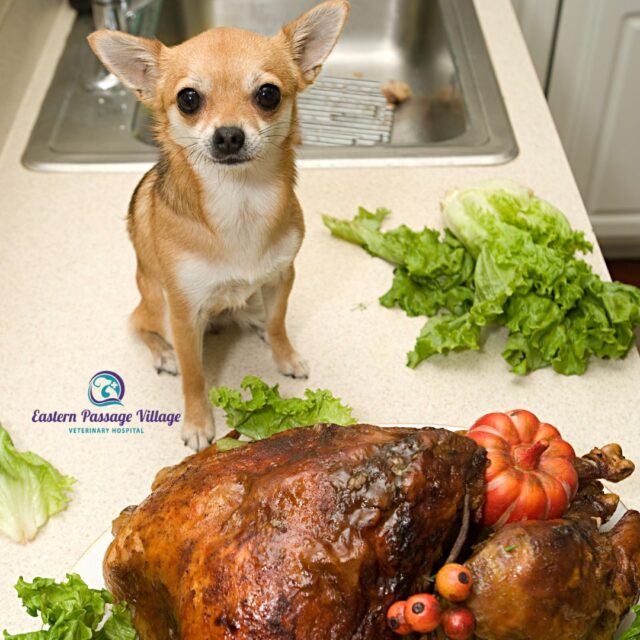
It’s the most wonderful time of the year. Snow is falling, Christmas lights are lit, and delicious cooking and baking fills our ovens and tables. In the season of giving, we may be tempted to give more and more treats to our pets. However, this gift of love may lead to some significant unwanted consequences.
Pancreatitis is an all too common diagnosis in the holiday seasons, secondary to dogs eating rich treats that they are not used to, whether offered by their loving owners, or stolen from the table or the garbage can.
There are multiple causes of pancreatitis ranging from metabolic disease and trauma to the use of certain drugs. However, one of the most notorious causes, particularly at this time of year, is the consumption of a recent rich and high fat meal.
Pancreatitis is a diagnosis that, quite simple, means inflammation of the pancreas.
The pancreas is an abdominal organ that is found adjacent to the stomach and has two main jobs. The first is to secrete insulin and glucagon. The second, and more relevant for the purposes of this article, is to secrete biochemicals that aid in the digestion of food. In a healthy pancreas, these products are produced, stored, and secreted when appropriate. In an inflamed pancreas (i.e. when there is pancreatitis) the enzymes are released inappropriately and try to digest the pancreas itself! This can lead to a vicious cycle of damage leading to further inflammation – both of the pancreas and of the surrounding tissues and organs. In severe, ongoing cases this can even affect the production of insulin and can progress to causing diabetes!
Common clinical signs of pancreatitis include decreased appetite, gastrointestinal upset including vomiting and diarrhea, abdominal pain, and even fever. This can occur suddenly or can persist at a low level for an extended period of time.
These clinical signs are largely non-specific and can be consistent with various other diagnoses including foreign body obstructions, gastroenteritis, infections, trauma and more. Because of this, in order to get to the root of the problem, your veterinarian will employ different diagnostic tools including blood work (there are special blood tests for pancreatitis) and imaging such as radiographs and/or abdominal ultrasound to rule in or out the multiple causes of these clinical signs.
Treatment of pancreatitis largely consists of supportive care. Depending on how ill your pet is, this may be out-patient treatment with pain medication, low fat diet and nausea medication. In more severe cases, hospitalization with IV fluids for rehydration may be required.
Prognosis for pancreatitis is generally good, however successful diagnosis and appropriate treatment in a timely manner is essential for successful management.
Cats can get pancreatitis too! However, in cats this is more commonly associated with pre-existing disease as opposed to dietary indiscretion. Diagnosis and treatment is similar as to in dogs, with prognosis depending on how severely affected the patient is.
One of the best ways to prevent a stressful, emergency vet visit over the holidays is to prevent your pet from consuming rich, fatty treats and table scraps. Instead of feeding excessive amounts of treats, show your love for your pet this holiday season with a new toy, a good cuddle, or a nice long walk.
If your pet eats something that they shouldn’t, or starts exhibiting signs
of gastrointestinal upset, please contact your veterinarian for guidance.
References Used:
- Pancreatitis in Dogs (Vet Partner)
https://veterinarypartner.vin.com/default.aspx?pid=19239&id=4952412 - Pancreatitis in Dogs (VCA)
https://veterinarypartner.vin.com/default.aspx?pid=19239&id=4952412 - Pancreatitis in Cats (Vet Partner)
https://veterinarypartner.vin.com/default.aspx?pid=19239&id=4951457 - Pancreatitis in Cats (VCA)
https://vcacanada.com/know-your-pet/pancreatitis-in-cats - Diarrhea and Vomiting: First Aid
https://veterinarypartner.vin.com/default.aspx?pid=19239&catId=102898&id=4951323&ref=petcube.com - VCA Food Intolerance in Dogs
https://vcacanada.com/know-your-pet/adverse-reactions-to-food-in-dogs#:~:text=Dietary%20indiscretion.,%2C%20plastic%2C%20or%20aluminum%20foil. - VCA Gastritis in Dogs
https://vcacanada.com/know-your-pet/gastritis-in-dogs
